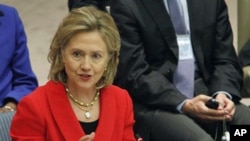U.S. Secretary of State Hillary Clinton embarks Wednesday on a two-week Asian tour that will take her to Vietnam, Cambodia, Malaysia, Papua New Guinea, New Zealand, Australia and China. The trip is expected to bolster Washington's ties with Asian allies as it looks to balance Beijing's influence in the region.
Secretary of State Hillary Clinton's first stop on the Asian tour is actually in the United States. She meets Japanese Foreign Minister Seiji Maehara in Hawaii on Wednesday for talks expected to tackle Tokyo's tense relations with China.
Ties between Asia's two largest economies frayed this year after a Chinese fishing boat collided with Japanese coast guard ships near disputed islands in the East China Sea.
Courting Japan
Japan's new government had been emphasizing closer ties with China, and distancing itself from the United States. Now, says Kerri Brown of Chatham House in London, the territorial dispute with China is giving Washington a new opportunity to woo Tokyo.
"It really underlines the role that the United States has in supplying a security umbrella in the Pacific Region," said Brown. "In the Japanese, who are obviously very reliant on American military support. So it's really kind of a big moment for the United States to re-establish how important the relationship is between it and Japan."
Collaborating with southeast Asian nations
Clinton waded into disputed Asian waters earlier this year when she announced that Washington could mediate conflicts between China and Southeast Asian countries claiming islands in the South China Sea. The subject is likely to come up again this week when Clinton joins the East Asia summit in Hanoi.
Brown said the 10 countries in the Association of Southeast Asian Nations, or ASEAN, have distinct political and economic views on China, but they share a wariness about its territorial claims. He said Clinton is likely to capitalize on these concerns.
"I think it's really kind of setting out a framework where, in fact, it's not just about China's interest, and China's going to have to start factoring in the fact that it's going to get a lot of opposition if it's just going to be unilaterally declaring its interests and think that the ASEAN countries are going to lie down," said Brown.
Clinton's trip will be her sixth to Asia in 18 months, reflecting the Obama administration's effort to sharpen its focus on the region that had been overshadowed by the wars in Iraq and Afghanistan.
U.S. focuses on region, China
David Lampton of the School of Advanced International Studies at Johns Hopkins University in Washington said U.S. efforts to warm up to its Asian allies is unsettling to China.
"Of course, China plays a major role in the region and tends to have a kind of lens or framework of containment. And so as the U.S. is trying to improve relations, I think this raises alarm bells in Beijing, seeing this as some kind of effort to contain China," said Lampton.
Despite ongoing tensions between Washington and Beijing over regional security, currency issues and human rights, Clinton added a brief visit to China's Hainan Island to her agenda just days before her departure.
Lampton said the visit demonstrates that despite the tensions, both countries are showing they are equally anxious to talk to each other. "I mean, the fact of the matter is China's our most rapidly growing export market. Also, China has an enormous domestic change underway. Urbanization. They still have to urbanize another 400 million people at least. A population bigger than the U.S. So they don't want any problems with us frankly, and I think all Americans realize we don't need any more problems in the world."
The Obama administration's discussions with Beijing will continue in January when Chinese President Hu Jintao visits the White House.

















